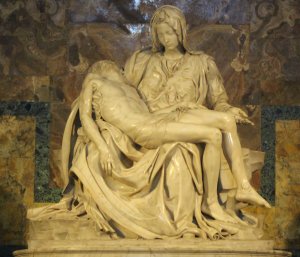Weekly Lenten Meditations
Week 1
As the Lenten season begins, God asks us to receive and cooperate with the ongoing liberation that He wants to accomplish for us. While we might focus in Lent on acts of penance and self-denial, God desires to increase in us our capacity to receive His grace and His love. These two actions—our efforts at conversion and God's self-offering—move together to produce holiness in our lives. Conversion is never purely our effort and always has communion with God as its final outcome. The Scriptures make abundantly clear that the Lord is ever giving Himself to us. Not only does He invite us to welcome Him, but He Himself actually gives us the capacity to receive Him, as the Holy Spirit prepared Mary to receive Jesus at the Annunciation. Lent permits us to focus our attention on God's intense desire for us and our passionate longing for God.
In the midst of ordinary life, our spiritual sensitivity can become dulled by the pace of activity and the volume of things competing for our attention. Lent calls us to simplify and to refocus. Lent summons us to a deeper stillness and inner reflectiveness. When life moves at a frenetic pace, we tend to anesthetize the deeper longings of our hearts. We stay superficial, carried by the din of calendars and entertainments, the wearying tug of "have-to" and "want-to." We give in to repeated distraction, not fully permitting ourselves to feel the deeper ache that yearns for further communion with the Trinity. Lent interrupts the ordinary routine and allows us to taste once again the deepest longings of our hearts. Lent also reminds us of God's loving pursuit of us as His dear children. By way of simple penances, we come to a greater awareness of our fundamental need for God and His eagerness to care for us. Lent challenges us to live more in the world of grace than in the secular sphere. Though Jesus himself has commanded us to ask, to seek, to knock, Lent reminds us that perhaps we have not asked enough of God. Instead, we may have tried foolishly to live predominantly from our own resources and our own strengths, as if God were not there. The charge with which God accuses Israel over and over again in the Old Testament is that His own people have forgotten the mighty deeds He has accomplished for them: election as a people dear to Him, rescue from Egypt, passage through the Red Sea, delivery into the Promised Land, Law, prophets, etc. It is Israel's forgetfulness that begins their drift toward false gods and immoral practices. Lent helps us to remember who God is and how much we mean to Him. See Isaiah 43, "Fear not, for I have redeemed you; I have called you by name, you are mine. . . You are precious in my eyes and honored, and I love you."
This holy season invites us not only to receive, but also to respond. Our cooperation is essential. The effect of grace is to change us inwardly and outwardly. God asks us to renounce the evil in the world and in our own lives. He wants us to suffer the death of our selfish attachments so as to discover the fullness of life in Him and in Him alone. See Psalm 62, "For God alone my soul waits in silence, for my hope is from Him. He only is my rock and my salvation, my fortress; I shall not be shaken."  Factual or not, the story goes that someone once asked Michelangelo how he carved the image of the Pieta from a block of stone. Michelangelo purportedly responded, "I saw the Pieta in the stone, and I simply took away whatever was not the Pieta." Sure, this is a cheesy metaphor, but it does capture the importance of sacrifice for genuine and lasting conversion to occur. If our sainthood is to emerge from our wounded humanity, then we must allow God in His great love and wisdom to chisel from us all that is not saintly. We must suffer, even joyfully, the blows of the hammer that bring to light the full grandeur of our own creation. A museum in Florence houses other versions of the Pieta that Michelangelo began but never completed. The human shapes are still emerging from the rough stone, but they are obscure, even alien. There is a promise of marvelous beauty in them, but the work was interrupted and the exquisite genius of the master artist was not realized. We don't want to end our lives as an unfinished masterpiece. Rather, we are ever becoming more visibly the icon of God in the world today, through divine grace operating upon us.
Factual or not, the story goes that someone once asked Michelangelo how he carved the image of the Pieta from a block of stone. Michelangelo purportedly responded, "I saw the Pieta in the stone, and I simply took away whatever was not the Pieta." Sure, this is a cheesy metaphor, but it does capture the importance of sacrifice for genuine and lasting conversion to occur. If our sainthood is to emerge from our wounded humanity, then we must allow God in His great love and wisdom to chisel from us all that is not saintly. We must suffer, even joyfully, the blows of the hammer that bring to light the full grandeur of our own creation. A museum in Florence houses other versions of the Pieta that Michelangelo began but never completed. The human shapes are still emerging from the rough stone, but they are obscure, even alien. There is a promise of marvelous beauty in them, but the work was interrupted and the exquisite genius of the master artist was not realized. We don't want to end our lives as an unfinished masterpiece. Rather, we are ever becoming more visibly the icon of God in the world today, through divine grace operating upon us.
Perhaps a medical image will also be help. Our sin is like a cancer growing in the soul and slowly diminishing our lives. Many people are understandably saddened to receive a cancer diagnosis, but this awareness actually offers hope, because now the cancer within can be treated. To be unaware of a tumor simply allows the malignant cells to grow and spread unchecked, perhaps leading to death. Having a surgeon cut into tissue to remove a cancerous growth is painful, but this pain brings about restored health. The suffering of a surgical procedure can prolong healthy life for many years, but one has to face the reality of the cancer to be able to undertake the remedy. In Lent, the whole Church searches out sin, so that we can ask the Lord to heal whatever is diseased. In another medical image, patients who have undergone heart by-pass surgery often note that they had no idea how limited their cardiac functioning had become. Once the body recovers from the invasive surgical procedure, sometimes a lengthy recuperation, people often discover that they have much more vitality than they did before the surgery. They simply did not know how much their functioning deteriorated because it happened so gradually. Sin has a similar progressive weakening of the soul, robbing a person of the joy and delight of existence itself. In Lent we submit ourselves to the care of the divine physician, who sees our spiritual illness with compassion and an eagerness to help. Jesus himself has become the medicine that restores us to life.
In these weeks of Lent, may the Holy Spirit remind us of the mighty works of God and instill unfailing confidence in us that the Lord wants only to share Himself with us. May we have the faith to seek the intimate communion with God that He desires with us, and may we repent of all that holds us back from being unreservedly His. What attachment do you ask the Lord to free you from in this Lent? What experience of friendship with Him do you ask the Lord to share with you? The purpose of Lent is only to help us to fall more deeply in love with the Lord.
 Meditation written by Fr. James Rafferty
Meditation written by Fr. James Rafferty